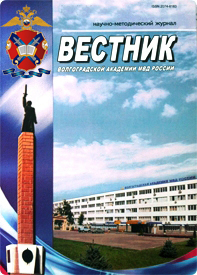Searching for arguments, which make it possible to consider permission as a normative regulation, a number of scientists distinguish several varieties of permission precisely as normative legal regulations. In this regard they distinguish such functions of permission as the authority to issue norms, authorization (empowering the person to issue norms), hierarchy arrangement, that is establishing a hierarchy between the two normative systems. However, such models of normative systems have certain theoretical flaws. If we assume that the authority of the sovereign to issue normative legal regulations refers to the permission of a weak type, we will unreasonably expand the object of legal regulation. And with this approach we don’t see differences between the sovereign and the rest of subjects described in the normative legal context. If we assume that the authority of the sovereign to issue normative legal regulations refers to the permission of a strong type, we will contradict the presupposition that the king’s power is unlimited. It’s also incorrect to characterize delegation of lawmaking authority through permission. It’s not permission but either obligating the person to issue norms or placing a subject into an arbitrary regime through determining the boundaries of the given arbitrariness by means of prohibitions (obligations). In the logical-structural aspect such delegation doesn’t differ in any way from obligation (prohibition). And the function of establishing a hierarchy of normative systems is also determined by means of prohibitions (obligations) but not through permission.
legal permission, subjective law, empowering (authorization), hierarchy arrangement, hierarchy of normative systems, delegated lawmaking
1. Vrigt G. H. fon. O logike norm i deystviy. M.: Progress, 1986. S. 245-289.
2. Kislov A. G. Dinamicheskiy podhod k deonticheskoy logike: semantika deonticheskih operatorov // Nauchnyy ezhegodnik Instituta filosofii i prava Ural'skogo otdeleniya Rossiyskoy akademii nauk. 2013. Vyp. 3. T. 13. S. 20-36
3. Kislov A. G. Intensional'naya semantika deystviy, norm i sankciy // Mir cheloveka: normativnoe izmerenie - 3. Racional'nost' i legitimnost': sb. trudov mezhdunar. nauch. konf. (Saratov, 13-15 iyunya 2013 g.). Saratov: KUBiK, 2013. 358 s.
4. Kovalevich O. S., Lisanyuk E. N. K voprosu o roli pozvoleniy v logike norm i filosofii prava // Logiko-filosofskie shtudii. 2013. № 3. T. 10.
5. Bentam I. Vvedenie v osnovaniya nravstvennosti i zakonodatel'stva. M.: ROSSPEN, 1998. 415 s.
6. Petrazhickiy L. I. Teoriya prava i gosudarstva v svyazi s teoriey nravstvennosti. SPb.: Lan', 2000. 608 s.
7. Bulygin E. V. Razreshayuschie normy i normativnye sistemy // Rossiyskiy ezhegodnik teorii prava. 2010. № 3. SPb.: Yurid. kniga. S.437-449.
8. Alchourron C. E, Bulygin E. V. Normative Systems. Springer Springer-Verlag, 1971. 208 p.
9. Al'churron K. E., Bulygin E. V. Normativnye sistemy // Rossiyskiy ezhegodnik teorii prava. 2010. № 3, S. 307-470.
10. Gobbs T. Leviafan, ili materiya, forma i suschnost' gosudarstva cerkovnogo i grazhdanskogo. M., 1991. 731 s.









